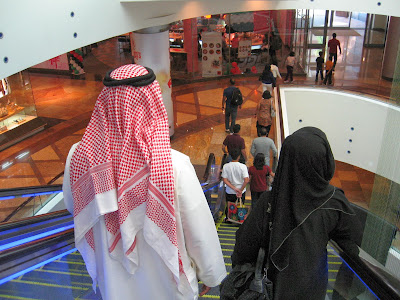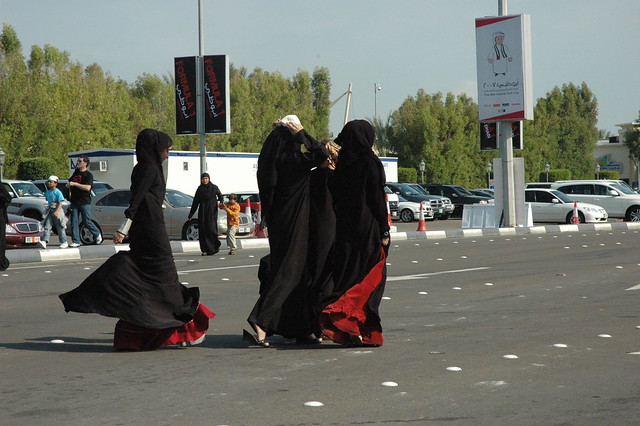Middle
Eastern Women
Separation of the sexes! No togetherness here, unless you are viewing
your potential husband under the watchful eyes of your parents. Women and men together? Not unless you’re married to him. No, rather women together shopping, eating,
having coffee or going to school.
I taught English as a Second Language (ESL)
in both Abu Dhabi and Dubai to a few mixed classes (adult men and women), but
mainly to segregated groups. Women only
in one class, then men only in the next class.
Most grade schools and high schools are for girls only or boys only, and
not ever on the same campus. Only the
international schools, the British or American schools are integrated. However, the local Emiratis typically do not
send their children to these schools, only the most progressive parents would
do that.
There are ‘Women Only Beaches’, ‘Women’s Entrances’ at banks with all female employees and tellers, ‘Women’s Waiting Areas’ in most businesses and medical facilities.
Men are not allowed to even enter or walk through the areas where women are waiting or being served. Women must have female physicians and, obviously, their OB/GYN is always a woman.
Bill was the Director of the Military Language
Institute which was overseen by the Abu Dhabi government. Therefore, our medical care was offered at
the Military Hospital. Of course, there
was an enormous ‘Women’s Only Entrance
and Waiting Room’. After you signed in
and registered, they asked YOU
to go to Medical Records and pick up your own medical records. What?
So, both men and women stood in line together at the Medical Records
Department.
The Women’s Waiting Room was packed full of women in black abayas, hijabs or veils, nannies, crying babies, toddlers running everywhere, strollers obstructing the walkways and parked at inconvenient angles. Waiting times varied from 30 minutes to two hours.
The Waiting Rooms contained very popular vending
machines. These Middle Eastern ladies
loved Coke and Pepsi, salty chips and sweet goodies from the large
machines. Their children also carried
bags of treats or chips around with them, and as most kids do, dropped lots on
the floor. TVs provided background noise
to cell phones ringing, women speaking in Arabic and rowdy, loud children.
I think I had the youngest female OB/GYN
in Abu Dhabi. She was barely 23 years
old and single. I asked her how many
years of medical school she had attended because she just looked so incredibly young. She told me that she went to ‘college’ to
study medicine and after four years, she was a doctor. No additional training, no residency, no
internship... Just four years of
medicine with, I hope, a concentration in obstetrics and gynecology. And, after only a few visits, she invited me
to her wedding for which she took off two months from work to prepare for the
wedding and then for the month-long honeymoon, typically in Malaysia.
Wouldn’t you think that these women would be quite modest? Well, the doctor’s office was the ‘changing room’, the ‘examining room’, and the room where the doctor talks with you and prescribes your medication. Sometimes there was a curtain around the examining table, sometimes not. So, I stripped my clothes off, put on the ugly blue gown with the opening in front and climbed upon the table with the crinkled paper alerting the OB/GYN that I was ready. The doctor rolled her chair away her desk and came over to my side of the small, cold room to examine me.
Middle Eastern women marry very young
because of the arranged marriages. They
begin having babies immediately, typically having several children. Most couples hope to have a boy as their
first born child. If they have a girl
first, there will most likely be several more pregnancies trying to have a son.
Muslim women must also have female driving
instructors. There are women’s prayer
rooms at all malls and businesses. Most
women pray at home rather than go to a mosque.
There is a separate prayer room for women in the Grand Mosque in Abu
Dhabi, but most mosques typically don’t accommodate women during prayer
times.
When I was the Executive Director of the
American Business Group in Abu Dhabi, I had to have two separate large metal
detectors at the entrance to the Gala Charity Ball at the Sheridan Hotel – one
for men and the other for women. We also
had women security officers staffing the metal detectors and searching handbags.
How would you like to live under one big
roof with your mother-in-law, father-in-law, sisters-in-law and
brothers-in-law?
Getting married? Pack your things and move in with your in-laws because that’s your new home. Most young men and their new wives move into the groom’s home with his family after the wedding. Now you’re really stuck with all of the females in the house, especially your lovely mother-in-law. Hope she likes you and hope you like her! You won’t be moving until the house is too full of couples and grandchildren. Then, the oldest son and his family can move out. But, you won’t be moving too far from your mother-in-law!
Getting married? Pack your things and move in with your in-laws because that’s your new home. Most young men and their new wives move into the groom’s home with his family after the wedding. Now you’re really stuck with all of the females in the house, especially your lovely mother-in-law. Hope she likes you and hope you like her! You won’t be moving until the house is too full of couples and grandchildren. Then, the oldest son and his family can move out. But, you won’t be moving too far from your mother-in-law!
The young Emirati bride can go out shopping
with a group, visit her friends or go to the park with her relatives, but her
mother-in-law usually knows where she is at all times and with whom. She keeps a tight rein on the
daughter-in-law’s activities and has informants everywhere. Saving ‘face’ and acting appropriately at all
times are important.
After
the young couple begins having children or if the husband can afford a nice
flat or villa, moving out could be an option.
But, being alone isn’t much of an option. When the young bride has a baby, she moves
back to her parents’ home to stay with her family for 40 days. Her husband can come to visit her and the
baby, but she won’t return to her husband’s family home until after the 40th
night. Again, a cultural tradition to
support the new Mom and baby with family to support her.
How
about the older Emirati women? From what
I’ve observed, women stop going out shopping, driving and to restaurants around
40-45 years old. Women in the USA are in
the prime of their lives during these years! Yet, in the UAE, I rarely saw
Muslim women who were over 40, much less 50 or 60. They have their daughters or daughters-in-law
do the grocery shopping for the families.
I wonder who does their abaya and clothing shopping. However, during our last stay in Dubai,
things were changing slowly and I did see some older women out shopping.
Occasionally, I would see a family with an older lady behind the screened section of a restaurant where privacy is a must. Eating out is always a challenge because of their veils. Women must either lift their veil to take each bite of food or be seated behind wood screens, curtains, in booths with doors or in an isolated family area in restaurants to remove their veil to eat.
What
about widows and divorcees? They usually
don’t remarry because there are few social occasions which would permit meeting
or interacting with eligible men. Also,
most men, regardless of their age, want to marry young women who can have
children. So, widows or divorcees rarely
go out in public nor are they introduced to men, unless a meeting is arranged.
The
Emirati women who work are a bit more progressive and at least have the ability
to have a conversation with a man who isn’t a family member. But, I didn’t see many older women in the
workplace.
I
did see older women at hospitals, clinics and pharmacies, but, they were
usually accompanied by their husband, son or daughter. Going out alone would be the exception for an
older woman.
As a
Western woman, I was allowed to go to the front of the line at the post office. However, this was the only place where I was afforded any privilege because I was a
woman. The first time I went to the post
office, I took my place at the back of a long line of men. Much to my surprise, the male postal employee
motioned for me to come to the front of the line so he could wait on me ahead
of the men. I was confused by his
summoning and asked if he really wanted me to go to the head of the line. Yes, he did.
My
choice of clothing was simple – conservative and appropriate. I was not required to wear an abaya or a hijab
over my hair. However, young girls and teenagers recognize
that their method of dressing is a part of their culture. Abayas, hijabs, veils and sheylas are fancier
than they were several years ago when I first lived in Abu Dhabi. Now the black garments have beads, colorful
embroidery, and intricate patterns on the cuffs, around the bottom of the abaya
and sometimes down the front and back of the long dress.
 |
| Day at the Beach in the Middle East |
My time in the Middle East was very special because I became friends with many local Emirati women through my teaching of English. I was honored to be invited into their homes for meals with their families and invited to weddings with them. We went out shopping and to lunch. We had a lovely time talking about our children, husbands, clothes, shoes, movies, books, travel and losing weight. They want the same things we do – a healthy, happy family, a rich husband, a good education for themselves and their children, a good job and they want to lose those last 10 pounds!












No comments:
Post a Comment